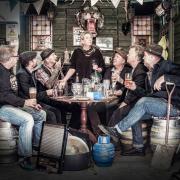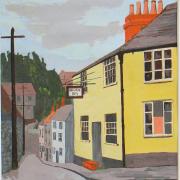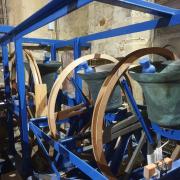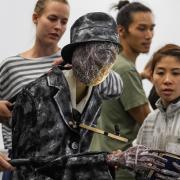Malcolm Rigby discovers a unique document that captures the sometimes colourful wartime experiences of Dorset's WI members
Jam and Evacuees: Dorset WI's Home Front Malcolm Rigby discovers a unique document that captures the sometimes colourful wartime experiences of Dorset’s WI members
Jam, Jerusalem and Calendar Girls with strategically placed buns are probably the first things that come to mind when you think of the Women’s Institute or WI as it is more commonly known. But during the dark days of the Second World War, on Dorset’s home front the WI were getting stuck in, providing invaluable help for the war effort, not only with their jam-making and preserving skills but also in keeping the home fires burning.Details of this determined culinary activity, and a whole lot more, can be found in a wonderful tome entitled The Dorset Federation of Women’s Institutes War Records, which is held at the Dorset History Centre in Dorchester. The title may seem a little dry but inside this beautifully bound A3-sized book is a delightful mixture of prose, poetry and illustrations that tell the stories of Dorset villages during the Second World War, through the WI members who lived there.
It is quite simply a neglected gem and therefore, not surprisingly, when the British Library held a countrywide ‘Hidden Treasure’ competition in 2007, it was one of the five winners. Ann Livingstone is Vice Chair of the Dorset Federation of Women’s Institutes. “We’re not entirely clear exactly who inspired the book but in 1947 the board of trustees at that time sent out a request to all the Dorset WIs asking them to ‘write down a bit about what happened to you and your village in the war’. Response came from 83 of the 145 WIs. Once they’d indicated that they had written something, they were supplied with this very special paper.”The paper is handmade. as Jacqui Halewood, Principal Archivist of the History Centre, reveals. “Our conservator looked at it and found the watermark. She thinks the paper is from about the time of the First World War and was made in Germany, which is slightly ironic.” The pages were bound in 1951 by respected bookbinder Eric Burdett, complete with a quote from William Barnes at the front: “Dorset folk don’t shame their kind”, and then the book was handed over to the History Centre in 1965, along with a whole lot of other Women’s Institute papers. “I’m sure when it first came in people were intrigued and delighted with it,” says Jacqui, “but I suppose it got lost in the mists of time both for the WI and for us. It was in the full meaning of the British Library competition, it really was a hidden treasure.”
Because of the win there are now 30-odd pages that can be viewed on the internet and a facsimile copy of the book can be seen at the Dorset History Centre, whilst the original is kept in the temperature- and humidity-controlled vaults.Most of the pages are handwritten and some are typed. There are drawings and photographs but crucially they are all from the perspective of women on the home front and that is what makes it truly unique and special. The star pages are probably those from Charmouth – brilliant colour illustrations of wartime activities, including a cow ascending to cow heaven after treading on a mine.Of course there are recurring themes from the different villages: the jam-making, the pickling, the knitting, the canteens and the clash of cultures with the evacuees. The Dorset folk often saw the latter as unwashed and inappropriately dressed, whilst the evacuees pined for the cinema, fish and chips, more shops and better transport.There are several accounts of German airmen parachuting into the countryside. For example, one who landed near Beaminster stole some clothes from a scarecrow and then brazenly walked through the village, with none of the locals noticing. Ann recounts the tale of teenager Kitty Tobias from Witchampton: “Her parents had gone to see a neighbour, and there was a knock on the door. Kitty had been washing her hair, and when she answered the door there was a German pilot standing there. She let him in and her brother ran off to find their parents whilst Kitty engaged him in conversation. When the parents returned they sat around waiting for the ARP wardens to come and collect the German pilot, who showed them photos of his family, and they discovered that he was really no different from them. After the war they tried to make contact with him but found out that he’d been killed in a motorcycle accident.”
The stories from Portland and Weymouth are noticeably different because these were communities really on the front line – bombings here were more deliberate and frequent, and evacuees rapidly disappeared as they realised it was possibly safer in London.Then, with D-Day imminent, Dorset was invaded by Allied troops, with soldiers billeted all over the county. Cranbourne Women’s Institute tells of their surprise at the number of black faces and their astonishment when they held a village dance and none of the black soldiers were allowed to come.The book is a collection of memories full of poignancy, tragedy and humour, with plenty of stiff British upper-lip and, of course, jam-making! But what of this hidden treasure’s future? “We have been exploring the possibilities of producing it as a book for quite some time,” Ann tells me. “It’s difficult because it is quite large. If we make it smaller then we’re going to lose the impact of the illustrations. When it first won its award several major publishers were interested, but then the credit crunch came along and they all sort of evaporated.”“We’d like to bring it to a wider audience,” Jacqui adds. “As far as we know this is the only example of its kind in the country. No other WI did this. We don’t know what the impetus was but somebody in the Dorset Federation of WI thought it would be a good idea and we’re very pleased that they did because it is a wonderful record of what happened during the war in our county.”Publishers! What are you waiting for?
Fact FileA facsimile copy of The Dorset Federation of Women’s Institutes War Records book can be seen at the Dorset History Centre, Bridport Road, Dorchester, DT1 1RP. 01305 250550 or click here or you can view some of the pages online at bl.uk/ttp2/hiddentreasures.html
We would love to hear your Dorset wartime memories. Do you remember the evacuees? Were you one of them? If you would like to share your home front stories and pictures with us, write and tell us or send an e mail to helen.stiles@archant.co.uk


























